Texas Senator Bob Hall Thursday evening in a town hall meeting at Hopkins County Courthouse gave n update on his involvement in the 87th Legislative session, including not only his office’s process regarding bills, the committees he serves on and priorities he took with him to the Regular Session, but how those bills and priorities fared.
Hall then took questions from the audience of approximately 50 people in attendance in the second floor courtroom June 10, with solar farms and education.
The District 2 Senator prefaced his discussion by noting that the information presented is from his Judeo-Christian perspective, that his priorities are Jesus Christ, family and Constitutional constructs, in that order. He also shared his opinions regarding COVID-19 pandemic and vaccinations.
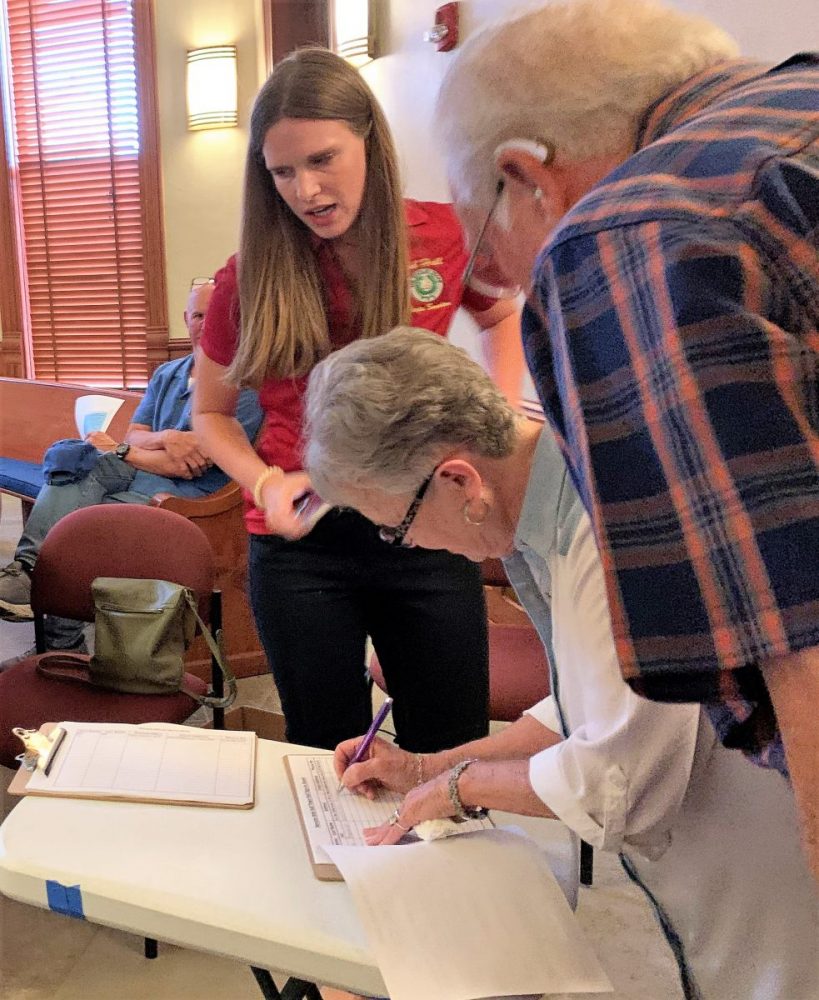
Of the roughly 7,000 bills filed only 1,181 made it to the Governor’s desk. Hall said he took on head-on only those for a committee he serves on and for which he would be on the floor, and able to actively support and potentially have an impact with. He chairs the Veterans Affairs and Border Security Committee, is on the Constitutional Issues Special Committee, Education Committee, Health and Human Services Committee, Local Government Committee, State Affairs Committee and Sunset Committee.
With those, Hall said, he made his priorities addressing: all hazards of grid security and securing Texas Electric Grid, election integrity, vaccine and health freedom, government overreach, pro-life and child mutilation issues, Second Amendment protections, religious freedom, education and broadband infrastructure. He said he also helped kill a few bills. The end result, Hall said was “not as bad as it could have been but not as good as it should have been.”
COVID-19
Hall believes policy regarding COVID-19 which impacted schools, businesses, government and even religious gatherings was made based on “unfounded” and “unsubstantiated fears.” Not treating COVID at the first signs of the virus using therapeutic prevention and advanced home treatment was a mistake, Hall said, and speculates that 90 percent of the people who died from COVID-19 would still be alive if those methods had been followed. Hall said he believes the decision for COVID-19 vaccines should be up to the individual and their physician. The issue is not an anti-vaccine issue, but one of “experimental” vaccines, drugs rushed through without thorough scientific research and FDA approval. More people had died after getting the COVID-19 vaccine during the first 4 months of administration than from all other vaccines in the last 20 years, Hall said.
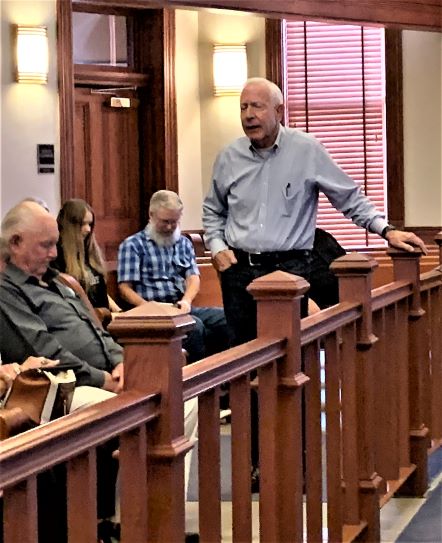
Religious Freedom
The Religious Essential Protection and Freedom to Worship Act deems religious organizations as essential at all times, including declared states of disaster and emergency prevents government from prohibiting a religious organization from engaging in religious activities and continuing operations.
The exception would be an evacuation order during a disaster such as a tornado; a county judge could issue an evacuation order which would apply to secular and non-secular entities during a disaster, according to Hall
Education
Hall said serving on the Education Committee is one of the most rewarding, as “nothing is more important” than the education of children. The budget was reduced from the $262 billion approved last session to $248 billion this time, with all areas receiving budget cuts except education, which he said will be “fully funded.”
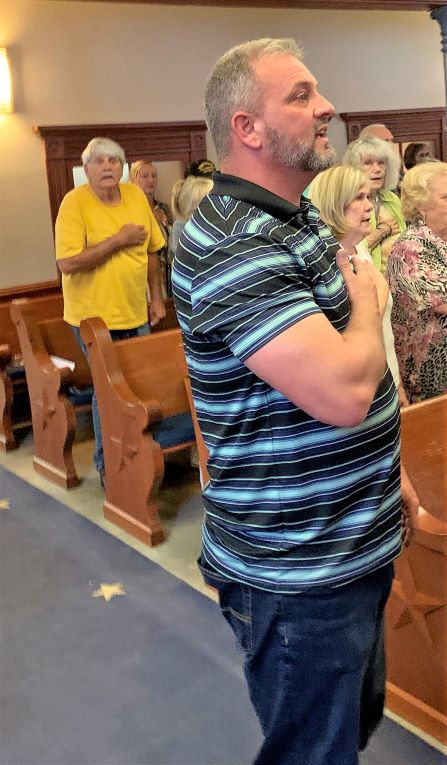
Danny Davis
Senate Bill 1536 is designed to help combat learning loss during the COVID-19 pandemic, employing a tutoring program to help public school students make up lost ground due to school closures and distance or virtual learning. Texas Education Agency, Hall noted, expects it to take 5-6 years for students to fully catch up for the “lost year” of education. However, Hall cautioned schools and other entities to be careful when spending federal funding to keep up with current guidelines and provisions, and watch for red tape, to ensure the “right rules” are being adhere
Sulphur Springs ISD, for instance, has been allocated $5 million, which will allow the district to implement a comprehensive afterschool tutoring program, including snack and bussing, to help students improve test scores, which were not only impacted by the pandemic but also by the first year of online testing and not having volunteers to serve as Book Buddies for elementary students over the last year. SSISD Superintendent Mike Lamb, who attended the meeting, said he does not believe it will take nearly as long as projected by TEA for SSISD students to recover ground lost since March 2020 due to COVID-19.
Election Security
Hall said his top priority is to “fix election problems.” He said while there may not have been any outright fraud, the way some elections are conducted allows room for errors. The state has 254 counties and each handles elections differently. The fact that there’s “no real penalty” aside from misdemeanor charges, for election scams leaves the door wide for potential election issues.
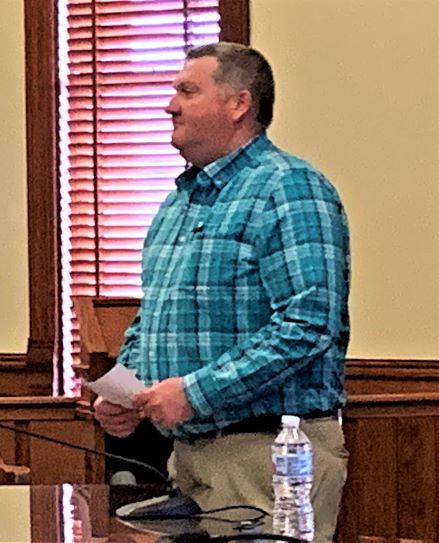
He said the way that some of the larger counties go about following the rule that mandates pole watchers be allowed in the room where votes are counted, by placing a line of chairs one one side of the room with a partition between the watchers and table where results are turned in is skewed. Drive-through voting enacted in 10 locations in one county during early voting, then, closing all except one location – an area that is primarily considered Republican – about the time the Attorney General ruled drive-thru as not legal, might be considered immoral, an effort to get Republican votes thrown out.
The proposed SB 7 was an attempt to increase protections for poll watchers, increase fairness of polling location distributions, ensure only citizens are voting and curtail potential abuse of mail-in ballot applications, require an audible paper trail, Hall noted. SB 7 never made it out of the House because members walked off the floor, breaking a quorum, Hall expounded.
2nd Amendment
Hall either authored, co-authored or supported several bills related to 2nd Amendment protections, among them Constitutional Carry and Emergency Carry. The Senator said it was fun as part to bust false myths about various topics, especially use of firearms in violent crimes.
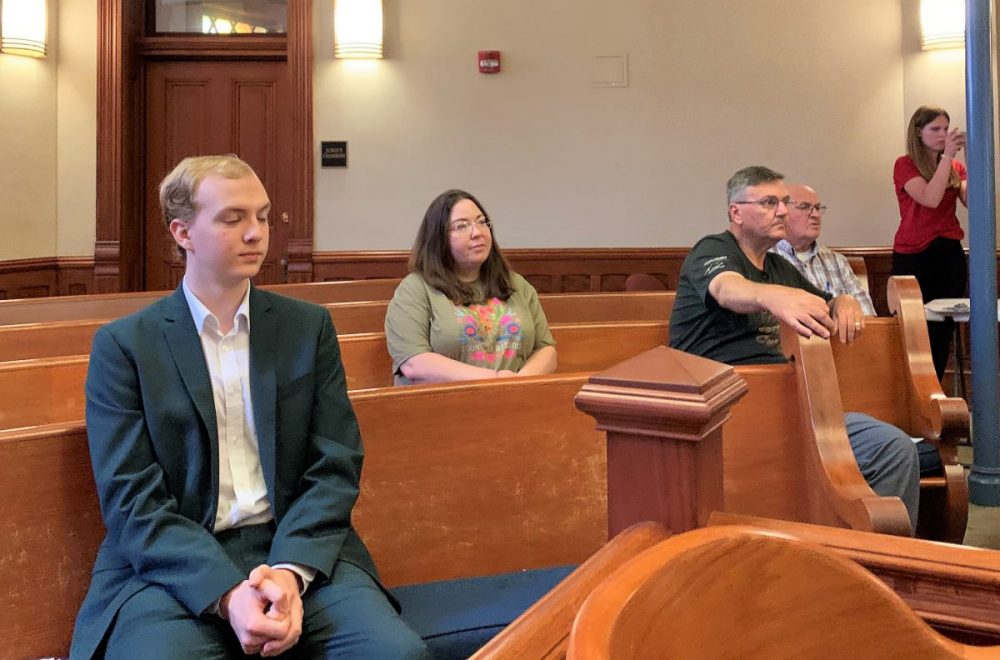
Constitutional carry, Hall noted, would allow people in Texas to legally purchase and possess a gun, which they then can carry without a license. However, under the bill, those who are currently prohibited from purchasing or possessing a firearm would still be ineligible to carry one. Those who pass a background check would be allowed to carry without a license. Convicted felons, certain people who have a been issued a restraining order, individuals who have not paid their taxes or child support would not be eligible.
When asked if there would be any public education about gun safety related to open carry, Hall noted part of another bill stipulates that Texas Department of Public Safety will offer gun safety programs free to anyone. The class would be optional not compulsory.
Other legislation passed during the 87th session repealed the Governor’s statutory authority to regulate firearms during a pandemic, clarified that local governments do not have authority to restrict operation of firearms businesses during a disaster, and stipulates that no governmental entities in Texas shall assist with enforcement of federal firearms laws that exceed those of Texas law. Any entity violating the 2nd Amendment sanctuary would forfeit state funding for the next year, Hall reported.
Pro-Life, Child Gender Modification
Hall said the results of bills he promoted related to abortion and child gender modification were split. The Heartbeat Bill (SB 8), signed into law by the Gov. Greg Abbott on May 6 prohibits abortions once a heartbeat is detected, which can be as early as 6 weeks. It also creates a civil clause of action for anyone other than government personnel to sue a health care provider who performs an abortion after a heartbeat has been detected.

Bills which would have prevented children under age 18 from undergoing gender transition treatments were defeated. He said one of those bills would have considered consenting to and performing child gender modification as child abuse. Another would have prevented health care providers who perform child gender modification from obtaining professional liability insurance coverage, and a third would have revoked licenses of providers who perform gender modification treatments. All of these proposed bills were blocked by House, according to Hall.
Hall said he too pursued bills which would have prevented a person born a male from competing in UIL girls/women’s sports. He a female athlete who held many records in her sport, but who was bested by a person born a male. In some cases, girls do not make UIL teams because who could have potentially been their spot went to an individual born a male, Hall said.
The District 2 Senator said 98 percent of children in this group have gender dysphoria. These children have yet or are still going through puberty, and have not finished development yet; they are also 20 times more likely to commit or attempt suicide, according to hall. Children younger than 18 years are not eligible to purchase alcohol and tobacco products, vote or serve in the military, thus, they should not be allowed to have gender modifications until they are of legal age to make gender modification decisions as well, Hall contends.
Energy Issues
Additional bills proposed regarding wind and solar farms, which Hall said Winter Storm Uri (often referred to as SnowVid 2021) showed are not reliable sources of energy, failed to pass. Discussions pertaining to the stability of the power grid revealed that the staff at ERCOT and the PUC were never trained. Price correction for the exorbitant rates charged during the winter storm, which ranged as high as $25 to $9,000 per kwh, was attempted during the Legislative session, but ultimately the entities involved could not agree so the proposal died, according to Hall.
Democrats and Republicans worked together on a bill to restructure ERCOT, with the board expanded from three to five members for enhanced communication and must live in Texas. There will be more oversight and an independent audit, according to the document passed by the House and Senate and sent to the Governor’s desk for approval. Differences on this were mainly between officials advocating for rural and urban areas instead of across party lines.
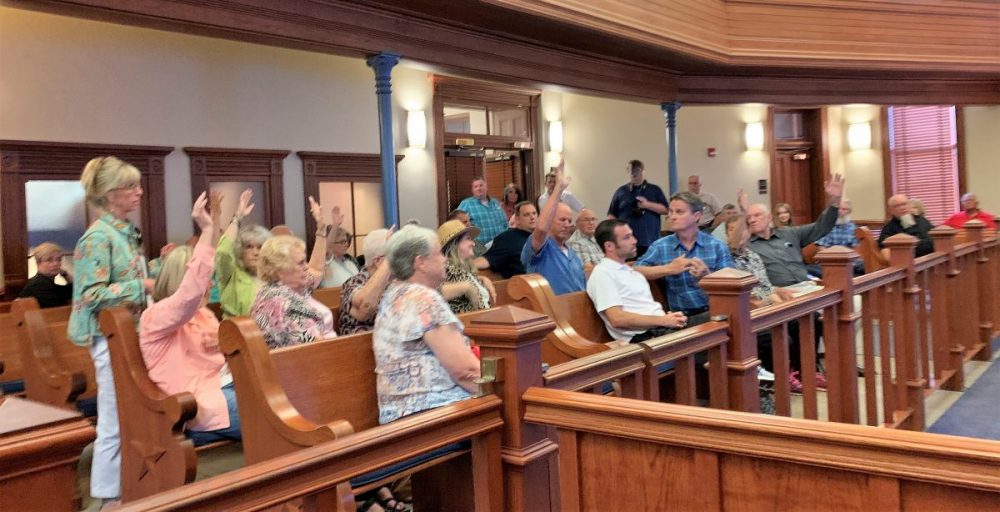
A bill addressing electric grid security made it out of the Senate but died in the House and failed to receive the Governor’s support as well, Hall reported.
Hall said among bills he helped to killed during the session was an extension of 313 Tax Abatement program, that is the program that allows tax incentives to be afforded to solar and wind energy projects. That, he said, no longer exists after September.
He answered several questions regarding local, state and federal duties, responsibilities of businesses and property owners, as well as potential options of residents in areas where solar and green energy projects have been greenlit. He noted that property owners have the right to do on and with their land as they choose provided they do not infringe on others’ rights. He acknowledged that “green” projects typically produce very few jobs.
Other Topics
HB 5 established a state broadband development office and a fund in the state treasury office to award grants, loans and other financial incentives to expand broadband infrastructure to rural and underserved areas of the state.
As for immigration and border security, there’s not a lot that officials can do if they encounter people in the country illegally unless they’ve committed a crime. Otherwise, they call Immigration and Customs Enforcement officials for advisement, and if ICE doesn’t take custody of them, they have to let the individuals go or face potential kidnapping charges for illegally holding the illegal immigrants.
The Senator said he also was happy to report House Bill 3 related to executive powers along with bills that would have legalize casinos and marijuana, and would have require Republican Party officer to run in open primaries were also killed.

Hall noted that on many occasions he worked with other officials, including Rep. Bryan Slaton, who was also in attendance at Thursday’s Town Hall meeting, on bills proposed.
Hall said another special session is expected to address redistricting. The date has yet to be announced by the federal government to address redistricting. If officials receive the information by Oct. 31, and can get the redistrict maps out by Nov. 22, primaries will be held in March on the regular schedule
Potential items of discussion for an upcoming special or future Legislative Sessions are redistricting, the data for which the federal government is delaying releasing until October; bail reform, including when alleged violent criminals can be released on bond; a ban on taxpayer funded lobbying, which he said prevents tax dollars from being used to fund lobbying, but would not prevent elected officials from voicing their opinions; property tax reform; the rollback of government executive power; border security; and women’s sports protection.
Recognition
Hall noted that it was his honor to be able to select from six candidates two to receive Congressional Medals of Honor, one who served through 1956 and one who served after 1956. All candidates were deserving of recognition, Hall said.
Marcelino Serna, a Mexican national served as a private in the US Army during World War I even after being given the chance to be discharged, received a Medal of Honor.
Serna was reported to have captured 24 German soldiers, who he refused to execute them even when ordered to do so by a superior officer. He was passed over previously for the Congressional Medal of Honor because of his inability to speak English, Hall said, he has now been awarded the Medal of Honor based on his service record and character.
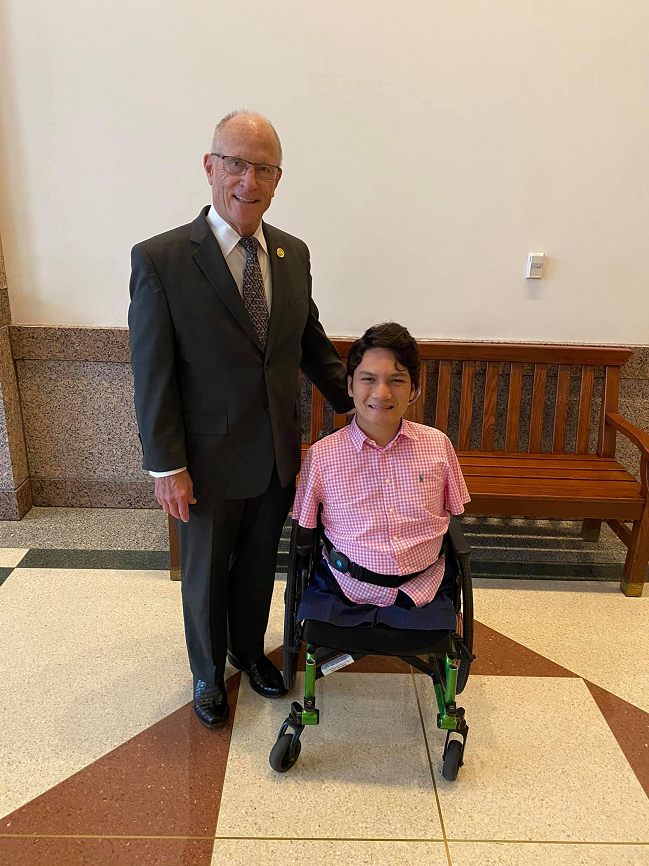
Also awarded a Congressional Medal of Honor was William Flores, a seaman apprentice with the US Coast Guard after 1956, who made sure that everyone got a life jacket, got in a life boat and off the sinking vessel after it became involved in a collision and went down with the ship.
Hall noted one Super Star Activist. He said all citizens should be as dedicated as 19-year-old lobbyist Edgar Pacheco Jr., who was a special needs student for a period of time enrolled in a homeschool program and did not receive credits for all of the courses taken when he reentered the classroom at school. The matter was not resolved and a grievance was filed, but he was not allowed to recover the credits at that school. He eventually attained credits, graduated and went on to community college, where wit a goal of one day becoming a constitutional attorney.
Because of his experiences, however, Pacheco lobbied to get a bill passed, extending the statute of limitations (SOL) in Texas for special education due process from 1 year to 2 years to ensure parents are able to ensure their student receives a “Free and Appropriate Public Education.”
Pacheco, a very intelligent man born with no arms or legs, was present almost every day of the Legislative session, going from office to office talking to everyone he could about the bill, lobbying support for it. When the bill came to the house floor, Pacheco was sitting in the gallery with his best friend to see it through, Hall recounted.
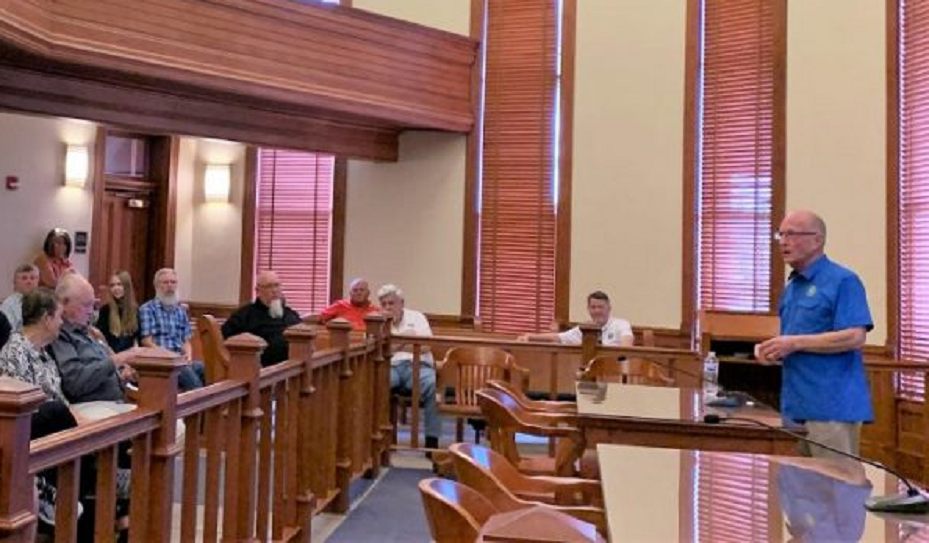
When Hall presented HB 1252, he said he wished he had naming the proposed legislation after Edgar Pacheco Jr. A motion was made amending it to the Edgar Pacheco Jr. Act, which passed.
Hall encourages citizens to follow Pacheco’s example, by attending school board and other local government meetings regularly to remain abreast of current events, and by speaking up and have their voices heard, lobbying elected officials. And, if that does not result in desired results, Hall encourages voters to make their choices known at the poll on Election Day.






